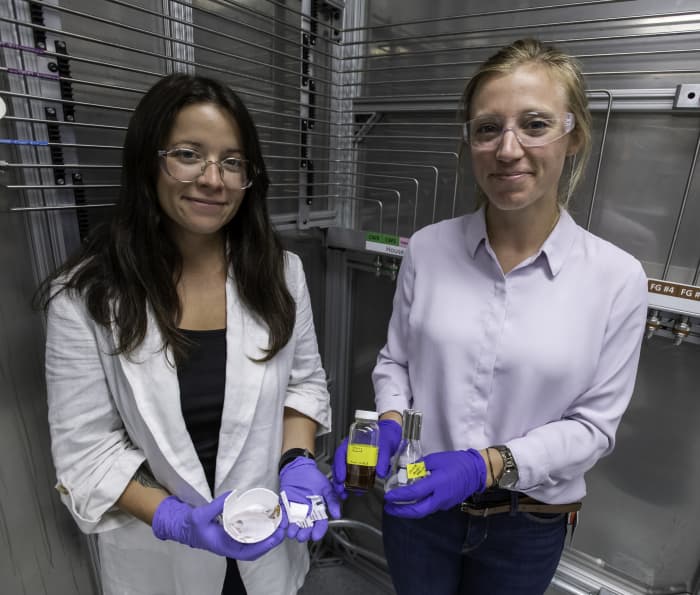It may sound like an unusual alliance: an Earth-orbiting space lab and a major comestics brand. But what draws the Center for the Advancement of Science in Space, manager of the International Space Station National Lab, and Estée Lauder together is a necessity to tackle plastic waste.
The ISS National Lab on Thursday announced winners for its Sustainability Challenge: Beyond Plastics, tapping the leading ideas for leveraging the waste and sustainability data that its orbiting laboratory collects into action to reduce plastics in landfills and the world’s waterways. Winners can also count on the lab to test their ideas.
The contest builds on an ISS workshop’s recommendations to address the plastics dilemma through the design and production of sustainable polymers aided by access to space.
Estée Lauder, whose beauty lines and packaging rely on the safety, hygiene and cost-effectiveness of plastic, but who has also declared waste cleanup and smarter plastic use as primary sustainability goals, will help fund the projects.
Estée Lauder
EL,
is aiming to have 75%-100% of its packaging be recyclable, refillable, reusable, recycled or recoverable as soon as 2025. It can already say that 70% of its packaging meets these goals.
Broadly speaking, the bottles, tubes and containers used annually by the cosmetic industry adds up to 120 billion units of plastics packaging. And of that plastic, about 70% ends up in landfills, according to data from 2020. In all, only about 9% of the world’s plastic is successfully recycled, according to a report from the Organization of Economic Cooperation and Development. OECD’s findings, released earlier this year, timed with United Nations’ efforts for a global plastic-reduction treaty.
One of the ISS winners focuses on microgravity synthesis of aerogel copolymers, led by Dr. Stephen Meckler of the Palo Alto Research Center, Inc., part of Xerox
XRX,

The Palo Alto Research Center team wants to use porous aerogels for carbon capture, utlimately replacing the oil in plastic with a carbon-based feedstock.
PARC
This project seeks to improve the performance of lightweight, porous aerogels to capture and remove carbon dioxide from the air. It’s the CO2-producing combustion of oil
CL00,
and other fossil fuels that is primarily driving global warming. But the project’s feature is two-fold. Ultimately, captured carbon dioxide could be used as a resource to replace oil as the leading polymer feedstock to produce plastics.
The second highlighted project is focused on the biological recycling of plastic waste. Led by Dr. Katrina Knauer of the National Renewable Energy Laboratory and the BOTTLE Consortium, this project aims to determine whether space radiation and microgravity influence the behavior of specific bacteria strains that break down plastics and produce polymer building blocks.
This is especially important because the process may be used in mixed plastic recycling consisting of many types of plastics. Results from this project may reveal new recycling mechanisms that could allow previously difficult-to-recycle plastics to be upcycled or made into materials of even higher value than the original plastics.

Contest winners and NREL researchers Katrina Knauer and Allison Werner will study how the pseudomonas putida bacteria strain can break down a variety of oxidized plastics in microgravity conditions on the International Space Station.
Bryan Bechtold / NREL
Consumer-products companies, including beauty brands, know their customers are becoming more aware of virgin plastic use, redundant packaging for shipping and other factors that can hurt biodiversity. Varied plant and animal life, clean soil and water sources, and more protections between the natural world and man-made development can be key to keeping a growing population healthy and thriving.
“When it comes to striking the right balance in terms of benefits and consumer demand, we recognize that plastic waste is a pressing sustainability issue,” said Stéphane de La Faverie, group president of Estée Lauder Companies, and global brand president, Estée Lauder.
Estée Lauder owns three of the top 10 global makeup brands and holds a 28% share of the global prestige makeup market. It logged annual revenue for 2021 at just over $16.2 billion.
“We are committed to provide consumers with exceptional product performance and uncompromising safety and quality, while tracking towards our sustainability goals by minimizing our plastic waste and advancing the use of alternative materials to develop more responsible packaging,” de La Faverie said.
